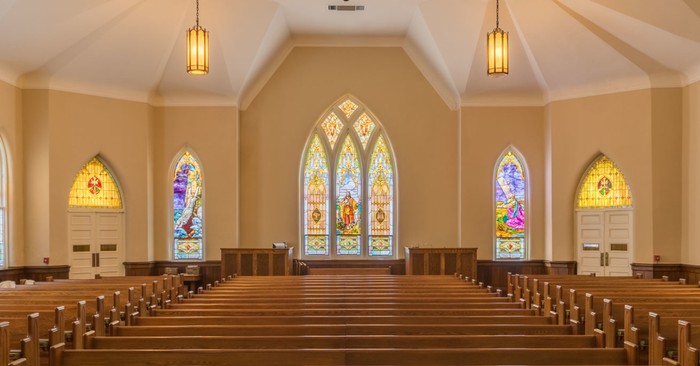
Throughout all of the years, something about the simplicity of the small Methodist church with a plain wooden cross, in a never heard of town in Northwestern Illinois, drew me back to the denomination as an adult. And the community at a local Methodist church keeps me coming back
For more on this series, click here.
Jesus Loves Me is the only song I ever learned to play on the piano. I remember sitting in my Aunt's dining room on a worn wooden bench, fingers poised on the keys as I practiced the notes over and over. I can still recall the musical notes in my head, and muscle memory guides my fingers some thirty years later. My Aunt faithfully played piano for the local Methodist church every Sunday morning. I would sit on the cushioned bench between my Grandma and Grandpa, mesmerized by her talent.
Living in the Bible Belt, you pass a church on just about every corner. There are grand cathedrals, an ornate Greek Orthodox Church, and massive Baptist churches, all within a fifteen-minute drive from my house. Then there are simple chapels, plain buildings with funny sayings on the letter boards, and even churches housed in strip malls.
I grew up in a Catholic church with breathtaking stained glass windows and a marble cross with an intricate statue of Jesus hanging on it. Still, I've experienced a fair share of different denominations throughout my childhood and adulthood. I've attended mass at various cathedrals and stood in awe at the back of the Santo Domingo Church in Santiago, Chile. One summer, I visited my brother's Pentecostal Church and then participated in the youth group at my best friend's Baptist Church.
As an adult, I've experienced traditional and contemporary worship styles as I've visited non-denominational churches and many other denominations. There were congregations of a mere fifty people to a couple of thousand in attendance. I've even attended a service on the beach outside the famous Flora-Bama bar. It's true! If you can't find a church that fits while living in the south, you haven't tried hard enough.
Reminiscing on the lyrics of Jesus Loves Me, I wonder is there a need for so many different denominations. Ultimately, don't we all believe in Jesus Christ as our Savior? Doesn't Jesus love us, and we love him? Doesn't the Bible tell us so? Do we genuinely need so many different styles of rituals and worshipping Jesus?
Of course, I can't answer any of those questions with a factual statement, just an opinion, but I can tell you a bit about the Methodist church. Throughout all of the years, something about the simplicity of the small Methodist church with a plain wooden cross, in a never heard of town in Northwestern Illinois, drew me back to the denomination as an adult. And the community at a local Methodist church keeps me coming back.
Truth – Methodists Believe in Social Holiness
What exactly is social holiness, you might ask? According to the UMC, "Social holiness is the practice of obeying Jesus' commandments to love God with all your heart, soul, and mind, loving your neighbor as yourself, and loving one another (fellow members of your local congregation) as Christ loves. When Wesley says that holiness is social, he means that the depth of your love for God is revealed by the way you love whom God loves."
The term, Social Holiness, is unique to Methodism and was preached by John Wesley. In Hymns and Sacred Poems (1739), Wesley wrote, "The gospel of Christ knows of no religion, but social; no holiness but social holiness. Faith working by love is the length and breadth and depth and height of Christian perfection."
The primary mission of the local church is to provide for the spiritual needs of its members and community. The church is to make disciples of Jesus Christ for the transformation of the world. Methodists believe in an intimate relationship with Jesus that will transform your life. In fulfilling the command of social holiness, they accompany others on their transformation journeys.
My favorite thing about the Methodist church is its commitment to serving the community, especially the marginalized. They believe faith in God leads you into service for others, and they participate in charity work to support afflicted and oppressed communities through Works of Mercy.
Because of Social Holiness, we live our lives together and walk with one another, especially those in need. The Methodist church has started hospitals, orphanages, group homes, homeless shelters, schools, and more to tend to people's bodily and spiritual needs and follow Christ's command to spread the gospel and serve others.
One example is the Embrace Alabama Kids and Embrace Florida Kids, formerly known as the United Methodist Children's Home, which has a one-hundred-and-thirty-year history of providing homes and support to children and families in need. Their mission states, "In Response to God's Word, we embrace and nurture vulnerable children and families by providing homes, healing, and hope."
In essence, Social Holiness is putting the words of 1 John 19-21 into action: "We love because he first loved us. Whoever claims to love God yet hates a brother or sister is a liar. For whoever does not love their brother and sister, whom they have seen, cannot love God, whom they have not seen. And he has given us this command: Anyone who loves God must also love their brother and sister" (NIV).
Truth – The United Methodist Church Ordains Clergywomen
One of the most heated topics I have witnessed in the Christian speaking and writing arena is whether or not women should be allowed in ministry. There are thousands of opinions on the subject matter attempting to answer the question, "Are women allowed to become pastors and preachers who teach to the entire congregation, including the men?"
According to the United Methodist Church, women can preach to men, women, and children. The United Methodist Church believes in the complete equality of women and the significance of women in decision-making and leadership positions at all levels of the church. The United Methodist Book of Discipline affirms this position on women's equality and authority.
The Methodist Church started ordaining women back in the late 1800s, but the official ruling happened on May 4, 1956, when the General Conference voted for full clergy rights of women. The founder of Methodism, John Wesley, believed in this equality too. He licensed the first woman, Sarah Crosby, to preach back in 1761. According to Wikipedia, over 12,000 women now serve as United Methodist clergy at all levels, from bishops to local pastors.
Many Christians who oppose the role of women pastors cling to the literal meaning of Paul's words in 1 Timothy 2:11, "I do not permit a woman to teach or to assume authority over a man; she must be quiet." The UMC stands by its decision, stating, "The United Methodist Church takes this scripture, like all scripture, and reflects on it critically in light of their Biblical and theological inheritance," according to an article on the UMC site. Also citing how Jesus challenged the conventional beliefs of His day that women were inferior to men when he had women as friends, disciples, and witnesses. The UMC states several other reasons for including women in ministry.
Lie - All Methodists are Expected to Agree on Social Issues Found in the Book of Resolutions
Given the current turmoil and division in the United Methodist Church over social policies, it's fascinating to learn that John Wesley first coined the phrase, "agree to disagree." According to an article on Crosswalk, "It was an indication of Wesley's manner of sticking to his convictions while remaining in connection with those with whom he disagreed." If Wesley were alive today, I wonder if he could use his words of wisdom to heal the current state of division and discord in the UMC.
Truthfully, inside or outside a church, no social subject is ever truly neutral, and there are always two sides or more to significant ethical controversies. The United Methodist Book of Resolutions exists to provide objectivity and address the many important issues affecting people's lives. The book contains all resolutions or pronouncements for matters approved by the General Conference that is currently valid. All such statements represent the official position of The United Methodist Church.
However, The Book of Resolutions is not legally binding, and the church members may agree or disagree with the stated policies in the book. These words are even stated in the user's guide to the Book of Resolutions. Essentially, you can "agree to disagree" and still be Methodist.
Photo Credit: ©Central United Methodist Church








